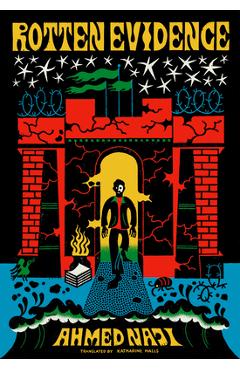Rotten Evidence - Ahmed Naji

Detalii Rotten Evidence - Ahmed Naji
Vânzător
libris.ro
Pret
111.6 Lei
111.6 Lei
124 Lei
Categorie (vânzător)
Biography & Autobiography
Marca
Ahmed Naji
Descriere YEO:
Descriere magazin:
In February 2016, Ahmed Naji was sentenced to two years in prison for violating public modesty, after an excerpt of his novel Using Life reportedly caused a reader to experience heart palpitations. Naji ultimately served ten months of that sentence, in a group cell block in Cairo\'s Tora Prison. Rotten Evidence is a chronicle of those months. Through Naji\'s writing, the world of Egyptian prison comes into vivid focus, with its cigarette-based economy, home-made chess sets, and well-groomed fixers. Naji\'s storytelling is lively and uncompromising, filled with rare insights into both the mundane and grand questions he confronts. How does one secure a steady supply of fresh vegetables without refrigeration? How does one write and revise a novel in a single notebook? Fight boredom? Build a clothes hanger? Negotiate with the chief of intelligence? And, most crucially, how does one make sense of a senseless oppression: finding oneself in prison for the act of writing fiction. Genuine and defiant, this book stands as a testament to the power of the creative mind, in the face of authoritarian censorship.

Rotten Evidence - Ahmed Naji - Disponibil la libris.ro
Pe YEO găsești Rotten Evidence - Ahmed Naji de la Ahmed Naji, în categoria Biography & Autobiography.
Indiferent de nevoile tale, Rotten Evidence - Ahmed Naji din categoria Biography & Autobiography îți poate aduce un echilibru perfect între calitate și preț, cu avantaje practice și moderne.
Caracteristici și Avantaje ale produsului Rotten Evidence - Ahmed Naji
- Departament: auto-moto-rca
- Ideal pentru iubitorii de mașini și motociclete.
- Conținutul acestui produs te ajută să întreții și să îmbunătățești performanțele vehiculului tău.
Preț: 111.6 Lei
Caracteristicile produsului Rotten Evidence - Ahmed Naji
- Brand: Ahmed Naji
- Categoria: Biography & Autobiography
- Magazin: libris.ro
- Ultima actualizare: 28-10-2025 01:22:05
Comandă Rotten Evidence - Ahmed Naji Online, Simplu și Rapid
Prin intermediul platformei YEO, poți comanda Rotten Evidence - Ahmed Naji de la libris.ro rapid și în siguranță. Bucură-te de o experiență de cumpărături online optimizată și descoperă cele mai bune oferte actualizate constant.
Descriere magazin:
In February 2016, Ahmed Naji was sentenced to two years in prison for violating public modesty, after an excerpt of his novel Using Life reportedly caused a reader to experience heart palpitations. Naji ultimately served ten months of that sentence, in a group cell block in Cairo\'s Tora Prison. Rotten Evidence is a chronicle of those months. Through Naji\'s writing, the world of Egyptian prison comes into vivid focus, with its cigarette-based economy, home-made chess sets, and well-groomed fixers. Naji\'s storytelling is lively and uncompromising, filled with rare insights into both the mundane and grand questions he confronts. How does one secure a steady supply of fresh vegetables without refrigeration? How does one write and revise a novel in a single notebook? Fight boredom? Build a clothes hanger? Negotiate with the chief of intelligence? And, most crucially, how does one make sense of a senseless oppression: finding oneself in prison for the act of writing fiction. Genuine and defiant, this book stands as a testament to the power of the creative mind, in the face of authoritarian censorship.
